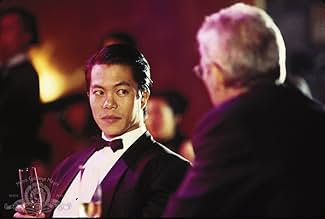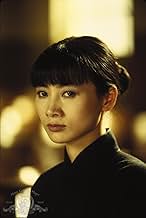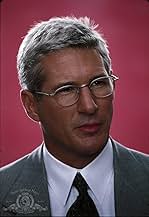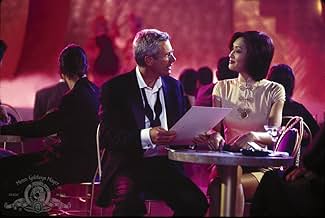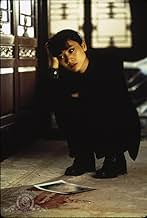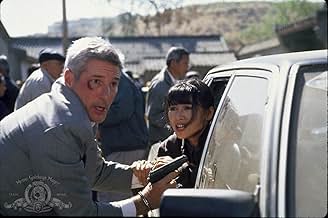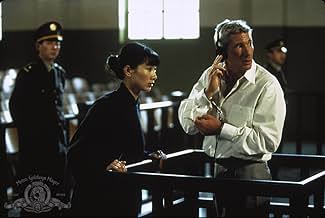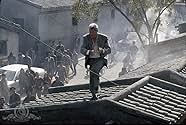VALUTAZIONE IMDb
6,3/10
19.253
LA TUA VALUTAZIONE
Un avvocato americano per affari in Cina viene arrestato ingiustamente e processato per omicidio e un'avvocatessa del paese è l'unica chiave per dimostrare la sua innocenza.Un avvocato americano per affari in Cina viene arrestato ingiustamente e processato per omicidio e un'avvocatessa del paese è l'unica chiave per dimostrare la sua innocenza.Un avvocato americano per affari in Cina viene arrestato ingiustamente e processato per omicidio e un'avvocatessa del paese è l'unica chiave per dimostrare la sua innocenza.
- Regia
- Sceneggiatura
- Star
- Premi
- 4 vittorie totali
Recensioni in evidenza
For about a dozen years, it was hard to find too many films Richard Gere made which weren't interesting and well-made. This was no exception. Once again, he "delivers the goods" and is involved in an interesting story.
Gere, a follower, I believe, of the Dalai Lama whom the Communists forced out of Tibet, uses this film to get his shots in at his mentor's enemy. Anyone who thinks this is just a coincidence is pretty naive. Nonetheless, the facts support the film's stark, brutal portrayal of Communist China's leadership. At the very least, it shows a regime unwilling to hear both sides of a story. (Hollywood has often given the same treatment to the U.S. government, showing it more often in a corrupt light, which is ludicrous compared to restrictive Communist China.)
Anyway, Gere really dominates this film, being in almost every scene. This is your basic frame-up-then-prove-your-innocence-in-court story. It keeps your attention throughout although I thought the ending was a bit confusing because things happened almost too fast for the viewer to take in. At two hours, the film could have been trimmed a tad but the lulls in here were not much.
Overall, an underrated film and unjustly criticized by the national critics, most of whom don't like it when communism is bashed.
Gere, a follower, I believe, of the Dalai Lama whom the Communists forced out of Tibet, uses this film to get his shots in at his mentor's enemy. Anyone who thinks this is just a coincidence is pretty naive. Nonetheless, the facts support the film's stark, brutal portrayal of Communist China's leadership. At the very least, it shows a regime unwilling to hear both sides of a story. (Hollywood has often given the same treatment to the U.S. government, showing it more often in a corrupt light, which is ludicrous compared to restrictive Communist China.)
Anyway, Gere really dominates this film, being in almost every scene. This is your basic frame-up-then-prove-your-innocence-in-court story. It keeps your attention throughout although I thought the ending was a bit confusing because things happened almost too fast for the viewer to take in. At two hours, the film could have been trimmed a tad but the lulls in here were not much.
Overall, an underrated film and unjustly criticized by the national critics, most of whom don't like it when communism is bashed.
Not well received back in 1997, this film deserved a much kinder evaluation, and in light of present geopolitical and commercial developments even appears to have been prophetic.
But of course hindsight's always easy, and since most people who reviewed Red Corner eight years ago never lived in mainland China, it was likewise not highly probable they would see it through the same jaded, seasoned eyes. And in fact, it helps to be experienced in China living when watching Red Corner, for much of its deeper mannerisms only become apparent if you know how and when to look for them.
For example, Richard Gere (as subtle and low-key as usual) portrays Jack Moore, a US-based business person willing to forego ideals and politics in order to enter the much vaunted mainland market, hyped up to be the best thing since instant noodles, when in fact like everything in life, it too comes at a price. When time arrives to sign a large media contract, Moore wants to pause and assess particulars by the book. He also notices China's newly-found penchant for blunt nationalism (oops, "patriotism", done nicely by a scene where he gauges club-goers' vehement reactions to a coaxing DJ), and doesn't quite feel good about his local contacts (including excellent veteran James Hong).
But as a simple mortal, Moore joins a gorgeous catwalking model (Jessey Meng) at his hotel room for a night of brief pleasures. Brief, because the next morning begins with him dragged away by Beijing cops who, having found the girl's dead body in the room and her fresh blood all over him, proceed to assume the American guilty.
Now, Red Corner's not a racist film. It doesn't fall into obvious stereotypes, nor does it contain any racial slurs (or profanity at all). Asians aren't made to be villains, just as the uncaring US embassy staff do not in any way represent the Western contingent. Having said that, the movie doesn't shy away from painful issues. It clearly conveys xenophobic attitudes found among mainland people and authorities, as many who've lived there can attest to. Of course, not everyone's like that, and competent actress Bai Ling (The Crow, Anna and the King) does well as Moore's honest, crusading defense attorney, Shen Yuelin, during what quickly devolves into a kangaroo court.
Meanwhile, Red Corner shows the abusive treatment our protagonist's subjected to, often to the point of endangering his life. When asked, Shen Yuelin's assistant says that Moore's frequent beatings are simply "because he's a foreigner", a familiar sentiment to non-Chinese residents of the mainland.
Similarly, the Americans involved in this legal fiasco wish to distance themselves from aiding Moore, as doing so might work against commercial interests based on sheer greed. Thus Red Corner preceded its time by faithfully showing how global factions are willing to play along just to get that great juicy carrot dangling from a stick most don't want to acknowledge. As of 2005, companies like Microsoft and HP openly pursue a policy of appeasement when it comes to China, willingly accepting political strings attached to what are supposed to be mere commercial activities.
And if you don't consider all that a sign of the film's credibility, how about the fact that mainland authorities quickly moved to ban it and prevent its cast and crew from entering China? Just for its attempt to challenge an authoritarian mindset and stand for free expression alone should Red Corner be applauded.
Additionally, it's a mostly believable project from start to finish, accurately sampling many of China's social staples through concepts such as "guanxi" (connections) and "da ge" (basically a nickname for somebody more respected than oneself), yet doesn't make any claims of exotica, while steering clear of clichés (save for Yuelin living with her kindly old grandmother). There's one scene showing Yuelin speaking to a police official in English so as to avoid making him "lose face", which is utter nonsense of course (probably the actor doesn't speak Chinese).
Moore himself speaks just a bit Putonghua (standard Chinese), as do many of the business people and newly-arrived in mainland China. Again, familiar from real life, as was the interaction between him and the locals. Beyond that, for something made almost entirely in California, Red Corner passes for Beijing with very few glitches (vehicles sometimes don't look authentic), featuring ample attention to detail and an atmosphere faithful to the original. Certainly, some footage was covertly shot in Beijing itself, yet due to the government's disapproving attitude, production had to relocate back to the States. All in all, Red Corner also plays it fair, going to show that China does have judicial systems with a potential to work as well as any others. It makes a point of addressing the mainland's criminal code, and court hearing procedures all appear in detail. Plus, eventually the truth does come out, and while it's pretty obvious who dunnit from the get go, this isn't the main point here.
The point is a warning against oppression wherever it may be and whatever form it may take, and a cautionary note regarding the perils of blind opportunism. Just because somebody promises you a gilded prize for playing by their rules doesn't mean those rules stop applying once the prize is obtained, if at all. And if we're not careful, there won't be too many reviews of this critical nature in times to come. Relations with China, as with any other nation, should be equivocal and based on standing for your own values, not another's, and that means not compromising liberties and freedoms standing at the very core of enlightened, progressive society. Like Red Corner's tagline says, leniency for those who confess and comply, severity for those who dare resist, that will be our downfall.
Rating: * * * *
But of course hindsight's always easy, and since most people who reviewed Red Corner eight years ago never lived in mainland China, it was likewise not highly probable they would see it through the same jaded, seasoned eyes. And in fact, it helps to be experienced in China living when watching Red Corner, for much of its deeper mannerisms only become apparent if you know how and when to look for them.
For example, Richard Gere (as subtle and low-key as usual) portrays Jack Moore, a US-based business person willing to forego ideals and politics in order to enter the much vaunted mainland market, hyped up to be the best thing since instant noodles, when in fact like everything in life, it too comes at a price. When time arrives to sign a large media contract, Moore wants to pause and assess particulars by the book. He also notices China's newly-found penchant for blunt nationalism (oops, "patriotism", done nicely by a scene where he gauges club-goers' vehement reactions to a coaxing DJ), and doesn't quite feel good about his local contacts (including excellent veteran James Hong).
But as a simple mortal, Moore joins a gorgeous catwalking model (Jessey Meng) at his hotel room for a night of brief pleasures. Brief, because the next morning begins with him dragged away by Beijing cops who, having found the girl's dead body in the room and her fresh blood all over him, proceed to assume the American guilty.
Now, Red Corner's not a racist film. It doesn't fall into obvious stereotypes, nor does it contain any racial slurs (or profanity at all). Asians aren't made to be villains, just as the uncaring US embassy staff do not in any way represent the Western contingent. Having said that, the movie doesn't shy away from painful issues. It clearly conveys xenophobic attitudes found among mainland people and authorities, as many who've lived there can attest to. Of course, not everyone's like that, and competent actress Bai Ling (The Crow, Anna and the King) does well as Moore's honest, crusading defense attorney, Shen Yuelin, during what quickly devolves into a kangaroo court.
Meanwhile, Red Corner shows the abusive treatment our protagonist's subjected to, often to the point of endangering his life. When asked, Shen Yuelin's assistant says that Moore's frequent beatings are simply "because he's a foreigner", a familiar sentiment to non-Chinese residents of the mainland.
Similarly, the Americans involved in this legal fiasco wish to distance themselves from aiding Moore, as doing so might work against commercial interests based on sheer greed. Thus Red Corner preceded its time by faithfully showing how global factions are willing to play along just to get that great juicy carrot dangling from a stick most don't want to acknowledge. As of 2005, companies like Microsoft and HP openly pursue a policy of appeasement when it comes to China, willingly accepting political strings attached to what are supposed to be mere commercial activities.
And if you don't consider all that a sign of the film's credibility, how about the fact that mainland authorities quickly moved to ban it and prevent its cast and crew from entering China? Just for its attempt to challenge an authoritarian mindset and stand for free expression alone should Red Corner be applauded.
Additionally, it's a mostly believable project from start to finish, accurately sampling many of China's social staples through concepts such as "guanxi" (connections) and "da ge" (basically a nickname for somebody more respected than oneself), yet doesn't make any claims of exotica, while steering clear of clichés (save for Yuelin living with her kindly old grandmother). There's one scene showing Yuelin speaking to a police official in English so as to avoid making him "lose face", which is utter nonsense of course (probably the actor doesn't speak Chinese).
Moore himself speaks just a bit Putonghua (standard Chinese), as do many of the business people and newly-arrived in mainland China. Again, familiar from real life, as was the interaction between him and the locals. Beyond that, for something made almost entirely in California, Red Corner passes for Beijing with very few glitches (vehicles sometimes don't look authentic), featuring ample attention to detail and an atmosphere faithful to the original. Certainly, some footage was covertly shot in Beijing itself, yet due to the government's disapproving attitude, production had to relocate back to the States. All in all, Red Corner also plays it fair, going to show that China does have judicial systems with a potential to work as well as any others. It makes a point of addressing the mainland's criminal code, and court hearing procedures all appear in detail. Plus, eventually the truth does come out, and while it's pretty obvious who dunnit from the get go, this isn't the main point here.
The point is a warning against oppression wherever it may be and whatever form it may take, and a cautionary note regarding the perils of blind opportunism. Just because somebody promises you a gilded prize for playing by their rules doesn't mean those rules stop applying once the prize is obtained, if at all. And if we're not careful, there won't be too many reviews of this critical nature in times to come. Relations with China, as with any other nation, should be equivocal and based on standing for your own values, not another's, and that means not compromising liberties and freedoms standing at the very core of enlightened, progressive society. Like Red Corner's tagline says, leniency for those who confess and comply, severity for those who dare resist, that will be our downfall.
Rating: * * * *
Overall, this isn't a bad movie. It's a pretty decent courtroom drama - sort of "Law & Order Beijing." It's got a lot of suspense, and it provides a fascinating glimpse of the inner workings of the Chinese justice system. I offer that last point with the proviso, of course, that the star of this movie is Richard Gere, and Gere is known for having a somewhat anti-Chinese (or, more accurately, anti-People's Republic of China) outlook. The view of China presented here is an ominous one - and that's not entirely fabricated. I travelled to China a few years ago. I never got in trouble with the law (thank goodness!) but still when you're walking through Tienanmen Square and a column of Chinese soldiers suddenly comes marching right toward you shouting at you, you know that the basic message (even though you don't speak Chinese) is "get out of the way or we'll trample you!" So, yes, even in completely unthreatening circumstances, there are vaguely threatening elements to being in China.
In this movie, Gere plays Jack Moore, an American businessman trying to close a deal in China, who picks up a girl at a nightclub. She ends up being murdered in his hotel room, he's the prime suspect and it's clear that "the system" has decided he's guilty before he even goes on trial and the court flat out refuses to hear any evidence that supports him and challenges the obviously pre-arranged verdict. How Moore can triumph over this system is the issue.
All that's pretty good. Gere's performance is good. The problem is the "one American man takes on the entire People's Republic of China" scenario. Yes, Moore had a court appointed defence lawyer (played by a young U.S. based Chinese actress named Ling Bai) who becomes increasingly sympathetic to him and wants to prove his innocence, but essentially Moore does it all himself. Even in the courtroom, he essentially takes over the case, questioning witnesses - even when his lawyer is there. That all was a bit too much, and it strained the movie's credibility too far. Still, it's an entertaining and suspenseful if perhaps implausible couple of hours.
In this movie, Gere plays Jack Moore, an American businessman trying to close a deal in China, who picks up a girl at a nightclub. She ends up being murdered in his hotel room, he's the prime suspect and it's clear that "the system" has decided he's guilty before he even goes on trial and the court flat out refuses to hear any evidence that supports him and challenges the obviously pre-arranged verdict. How Moore can triumph over this system is the issue.
All that's pretty good. Gere's performance is good. The problem is the "one American man takes on the entire People's Republic of China" scenario. Yes, Moore had a court appointed defence lawyer (played by a young U.S. based Chinese actress named Ling Bai) who becomes increasingly sympathetic to him and wants to prove his innocence, but essentially Moore does it all himself. Even in the courtroom, he essentially takes over the case, questioning witnesses - even when his lawyer is there. That all was a bit too much, and it strained the movie's credibility too far. Still, it's an entertaining and suspenseful if perhaps implausible couple of hours.
I came across this movie on Hulu last night by accident, after failing to stream two other movies, and am overall glad I decided to "settle" for it. It definitely could have been better in several ways, but the historical/legal aspect of it, set in transitional 90's Communist China is actually pretty outstanding and memorable. As one other user commented, the Chinese acting is perfectly convincing and even frightening in how realistic it is, but unfortunately Richard Gere's character is a little too...I don't know, idiotic? for my liking. Still, I wouldn't say he single-handedly ruined the movie.
Reading the production notes and trivia on here is interesting to me because it shows how the producers really did capture the reality of what goes on in Red China. I visited all over China and Lhasa, Tibet, right after the olympics and can vouch that the same legal situation still exists there today. In Beijing, we drove by a large, concrete and windowless court-building with the CCP emblem (seen many times in the film, and omnipresent in China in general) and when asked what the building was, my tour guide just responded plainly, "That's where you go to die."
For a foreigner, yeah, it might take a murder or espionage charge to keep you imprisoned indefinitely over there, but for Chinese citizens, many crimes are still punishable by execution without a fair trial, just as the film accurately portrays.
So, if you're into Chinese history or culture, then this is definitely worth watching, even more than once. If not, then don't watch it.
Reading the production notes and trivia on here is interesting to me because it shows how the producers really did capture the reality of what goes on in Red China. I visited all over China and Lhasa, Tibet, right after the olympics and can vouch that the same legal situation still exists there today. In Beijing, we drove by a large, concrete and windowless court-building with the CCP emblem (seen many times in the film, and omnipresent in China in general) and when asked what the building was, my tour guide just responded plainly, "That's where you go to die."
For a foreigner, yeah, it might take a murder or espionage charge to keep you imprisoned indefinitely over there, but for Chinese citizens, many crimes are still punishable by execution without a fair trial, just as the film accurately portrays.
So, if you're into Chinese history or culture, then this is definitely worth watching, even more than once. If not, then don't watch it.
Red Corner is quite obviously a comment on the current situation in Red China. Being a good friend of the Dalai Lama and Tibet in general, the "the Chinese government and army are all bad people" argument is what keeps this film going. It could almost be considered a crash course on what is still going on in China today. Don't get me wrong, the film is actually quite well done and has a good story to go with it which makes it more than a two hour CBS special.
The whole plot centers around the Gere character being framed for a murder of a Chinese girl. The girl just happens to be the daughter of an important general which makes Gere's chances of survival all the less. Sure, all of the cliches are built into this film, especially the wrongfully imprisoned man (haven't the 90's been a real haven to these kinds of films ever since "The Fugitive?"). But the plot is still interesting the film throughout and other than a few twists that seemed unnecessary, keeps focus until the end. I never will understand why Gere didn't just stay at the embassy, he must have been somewhat crazy.
The bond between the two main characters starts off very cold and warms until the end with an airport scene that was very fitting. After watching the film you'll know what I mean. The chase scene through the city is very exciting although at times farfetched, but still makes for some good action in between a few dramatic scenes. Even without on screen violence ala American History X or Saving Private Ryan, this film still manages to invoke fear simply knowing that the Chinese will do whatever they please, regardless of human life.
This film only helps to show China as an unhumanitary state with archaic laws and traditions. When one is forced to plead guilty in order to have leaniency directed towards them, something is really wrong. Hopefully this film will open some eyes to the situation and be a catalyst to future change.
7/10 stars.
The whole plot centers around the Gere character being framed for a murder of a Chinese girl. The girl just happens to be the daughter of an important general which makes Gere's chances of survival all the less. Sure, all of the cliches are built into this film, especially the wrongfully imprisoned man (haven't the 90's been a real haven to these kinds of films ever since "The Fugitive?"). But the plot is still interesting the film throughout and other than a few twists that seemed unnecessary, keeps focus until the end. I never will understand why Gere didn't just stay at the embassy, he must have been somewhat crazy.
The bond between the two main characters starts off very cold and warms until the end with an airport scene that was very fitting. After watching the film you'll know what I mean. The chase scene through the city is very exciting although at times farfetched, but still makes for some good action in between a few dramatic scenes. Even without on screen violence ala American History X or Saving Private Ryan, this film still manages to invoke fear simply knowing that the Chinese will do whatever they please, regardless of human life.
This film only helps to show China as an unhumanitary state with archaic laws and traditions. When one is forced to plead guilty in order to have leaniency directed towards them, something is really wrong. Hopefully this film will open some eyes to the situation and be a catalyst to future change.
7/10 stars.
Lo sapevi?
- QuizIn order to heighten the film's sense of reality, director Jon Avnet, actress Bai Ling, and co-producer Martin Huberty traveled to Beijing for a week of "guerilla" shooting, without the knowledge or permission of the Chinese government, to capture the first-ever 35mm film of the city to appear in a Hollywood film.
- BlooperThe closing scene of a Chinese airport reveals an American West 737. American West does not fly to China.
- Citazioni
Shen Yuelin: If you plead not guilty, you will be sentenced to death. And, unlike in your country, Mr. Moore, sentences are carried out within a week. You will be shot, and the cost of the bullet will be billed to your family.
- Curiosità sui creditiThe opening title is first displayed in Chinese "letters" (called hanzi) which then change into English.
- Colonne sonoreY.M.C.A
Written by Henri Belolo, Jacques Morali and Victor Willis
Performed by The Village People
Courtesy of Scorpio Music and Courtesy of Mercury Records, Inc.
By Arrangement with PolyGram Film & TV Licensing
I più visti
Accedi per valutare e creare un elenco di titoli salvati per ottenere consigli personalizzati
- How long is Red Corner?Powered by Alexa
Dettagli
- Data di uscita
- Paese di origine
- Sito ufficiale
- Lingue
- Celebre anche come
- Red Corner
- Luoghi delle riprese
- Pechino, Cina(Establishing shots, including the opening scenes were shot in Beijing, including a bicycle ride through Tiananmen Square.)
- Aziende produttrici
- Vedi altri crediti dell’azienda su IMDbPro
Botteghino
- Budget
- 48.000.000 USD (previsto)
- Lordo Stati Uniti e Canada
- 22.459.274 USD
- Fine settimana di apertura Stati Uniti e Canada
- 7.403.362 USD
- 2 nov 1997
- Lordo in tutto il mondo
- 22.459.274 USD
- Tempo di esecuzione2 ore 2 minuti
- Colore
- Mix di suoni
- Proporzioni
- 1.85 : 1
Contribuisci a questa pagina
Suggerisci una modifica o aggiungi i contenuti mancanti

Divario superiore
What is the Brazilian Portuguese language plot outline for L'angolo rosso - Colpevole fino a prova contraria (1997)?
Rispondi

